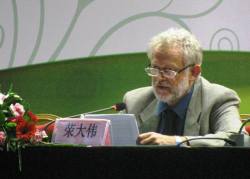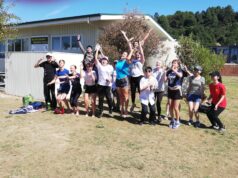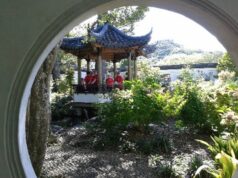The following speech was delivered by Dave Bromwich, NZCFS Vice President
at Beijing International Forum on People to People Friendship, September 6-8 2011
“New Zealand China Friendship Society’s Experience of International Cooperation”
President of Beijing Youxie, fellow delegates.
Pengyoumen, Nushimen, Xianshengmen, Nimen hao

I bring you greetings from New Zealand China Friendship Society President Eric Livingstone, and all our members in New Zealand. I am very honoured to attend this Beijing International Forum on People to People Friendship, and thank you for the invitation extended to me and my fellow delegate, Deborah Rhode.
Deborah and I are enjoying hearing what others are doing. Now I would like to take this opportunity to outline some of the activities of our organisation in New Zealand.
Next year is the 60th birthday of New Zealand China Friendship Society (NZCFS). I want to start by looking back at two people whose legacy we cherish, outline what they achieved in China, then look at some of the activities we use to express that legacy today .
The most famous New Zealander in China was Rewi Alley, who contributed perhaps more than any other foreigner to the Chinese revolution. He was the founder and inspiration for the New Zealand China Friendship Society, dedicating 60 years of his life to his adopted country, while remaining a New Zealander at heart.
In the late 1930s and early 1940s Rewi Alley established a large number of co-operatives throughout China. His commitment to establishing co-operatives and the institutions to educate co-operative leaders has inspired our Society to support his work, which continues long after he has gone. These include the Gung Ho co-operative movement ( or the International Committee for the Promotion of Chinese Industrial Co-operatives, ICCIC),which is very active today in building small-scale democratic co-ops and providing advice to government and private enterprises interested in developing co-operative structures. NZCFS is a member of ICCIC, and I represent NZCFS on the executive of Gung Ho, serving as a vice chair of that organisation.
Over the last 6 years, NZCFS has worked with ICCIC and local partners in Gansu, Shaanxi and Sichuan provinces to continue the promotion of co-operatives. Through funding support from the New Zealand government’s Ministry of Foreign Affairs and Trade, over 50 co-operatives have been developed as models, serving to further enhance effective management of other co-operatives downstream of each project.
In the 1940s, Rewi Alley also pioneered technical training schools using the Bailie Education philosophy of “hands and minds together” to train young people in the skills needed in the co-operatives. The most famous of these is in Shandan County in Gansu, an oasis town on the edge of the Gobi Desert. It contributes educated and skilled young people to that impoverished region. NZCFS recruits New Zealand teachers of English for the school, as well as assisting with delivery of the rural co-operative development training programme through the school. Shandan County has now been firmly established as a model county for training of rural producer co-operative leaders and promoters.
A second New Zealander we cherish is Kathleen Hall, Chinese name He Mingqing. She was a heroic New Zealand nurse who worked in an impoverished village in the Taihang Mountains and smuggled medical supplies to Norman Bethune and the 8th Route Army until the Japanese deported her and burned down her clinic. NZCFS has supported the replacement clinic and school in the village of Songjiazhuang that bear her name. We also commemorate her legacy through a scholarship to allow poor rural students to attend university for 3-4 years and become public health nurses. We call it the He Mingqing Scholarship.
Our first two He Mingqing scholars graduated in 2010, and have returned to their home counties to work: Wei Yunjie to northeastern Guangxi, and Shen Qianqian to southern Hebei. We are currently supporting two others: Shi Hongli comes from a poor county next door to Shandan in Gansu and is beginning her third year, while Wang Shuizhen comes from Feng county in Shaanxi, and is beginning her second year.
In New Zealand the He Mingqing Scholarship has enthusiastic support from most of our branches, which organise fund-raising events such as banquets, sales and raffles. In this way we can support each annual scholarship at RMB 8,000 yuan, which covers most of the scholar’s tuition and other expenses.
Following the 2008 earthquake in Sichuan, NZCFS initiated several reconstruction projects, two in Sichuan and two in Shaanxi making a total contribution of over 900,000 yuan with NZ government assistance. In Sichuan, the projects were rebuilding irrigation channels and establishing tea and vegetable co-operatives in Pengzhou. In Shaanxi, we helped rebuild a health clinic that serves 6,000 people in Feng County, and we helped farmers in Luoyang County to grow walnuts on their hill fields.
Rewi Alley established his first Bailie School in Feng County of Baoji district in Shaanxi. It is also the location for an NZCFS funded rural women’s health care project. In addition, Feng County participates in the current project to establish model co-operatives, and is the home of our latest He Mingqing scholar. All this activity is implemented through partnership between NZCFS and the Shaanxi Provincial Women’s Federation.
This has given a brief introduction to the activities we have today that commemorate the contribution of two great New Zealanders. We are a small organisation, and focus this work by targeting specific locations related to our heritage. The past is a foundation for our current and future work.
In New Zealand, an important objective of NZCFS is education: providing the New Zealand public with knowledge about China. Knowledge overcomes ignorance and prejudice, and the most effective knowledge, of course, comes from personal contact and experience. An important activity for NZCFS is to organise tours every year so that people can to come to China to meet Chinese themselves, and gain a firsthand impression of what China is all about.
In recent years, China has become a major international tourist destination, and there are many tours available to China. Today, NZCFS tours have a new focus on visiting our projects to keep these projects alive in our minds. We meet NZCFS partners like Women’s Federation, beneficiary groups like farmers and village based community groups, and we dine with our He Mingqing scholars. These project tours have proved very popular with our members, because they go to out-of-the-way places and present the worthwhile things we are doing in China. They are also important in keeping the connection with our past open to our members. Through this approach, the success rate in developing understanding and sincere friendship between our two people, I believe, is very high.
Today NZCFS has 14 branches with about 700 members across the country. Within New Zealand we are involved in various kinds of activities. Each branch organises its own programme, and they vary greatly, but most have monthly meetings. We encourage the study of Chinese language by organising prize-giving ceremonies and speech contests and by working with the three Confucius Institutes newly established in our country. We develop close relations with the local Chinese associations in our city and reciprocally attend each other’s events. And we seek Chinese friends whenever and wherever.
The future demands that youth is encouraged to participate in developing understanding and friendship. It is a sad fact that in New Zealand, I represent a younger side of NZCFS membership! What can we do?
Our Auckland Branch president, George Andrews, who has his own television production company, has produced two DVDs for us. One is called “Kia Ora, Ni Hao”. Kia ora is Maori for ‘hello’ – Maoli hua is the language of New Zealand’s indigenous people. “Kia Ora Ni Hao” presents three weeks in the lives of six 18-19 year old Maori students, during their time in Beijing, home staying and attending the school of their home stay brothers and sisters. It is a very moving account told by the New Zealand students of their experiences away from home, in the home of a new family and at school in a different culture. For next year’s 60th birthday, we hope that we can produce a new DVD that will record the experiences of a group of young New Zealanders visiting the legacies of our forebears in China, and their interactions with young people participating in our projects in those areas.
A major aim of this forum is for all of us to learn from each other. If you would like more information about us, please visit our website, www.nzchinasociety.org.nz




